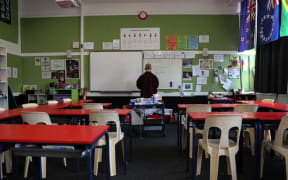
The new government has agreed to remove sexuality and relationship guidelines that were introduced in 2020 from schools. Photo: 123RF
The lead writer of the sexuality and relationship education guidelines is alarmed the new government has agreed to remove them.
The deal comes under National's coalition deal with New Zealand First, which campaigned on removing "gender ideology" from the curriculum.
Education professor Katie Fitzpatrick said removing the sexuality and relationship guidelines for schools was a backwards step.
"I think that would be a huge mistake. It would be really against what young people want. We've had three petitions to Parliament in the last seven years from young people advocating for better relationships and sexuality education in schools."
Fitzpatrick led the team which wrote the guidelines that were introduced in 2020 by NZ First MP and associate education minister at the time Tracey Martin.
There are two documents, one for Year 1 to 8 and another for Year 9 to 13.
She said they reflected huge progress in education around consent, inclusion and shifting societal norms.
There was a strong focus on teaching young people to think critically about social media, pornography and sexual content online, she said.
"There's a lot of information and messages about relationships, sexuality, body, gender and I think schools can really help young people engage with that."
Fitzpatrick said it was unclear from the coalition documents what the guidelines would be replaced with.
But she believed removing them would send a strong signal to schools to stop teaching about sexuality and relationships.
"We need to make sure that we're not going back to some sort of regressive form of schooling which looks to repress knowledge about health and sexuality for young people."
Post Primary Teachers' Association acting president Chris Abercrombie said schools needed more information from the new government.
That was because he was not sure what they were trying to achieve.
"In 2018, the Education Review Office did a study into sexuality education in schools. It concluded that most schools were meeting the minimum standards, but many had significant gaps in their coverage. So, by removing these guidelines, those gaps are going to get wider."
He said the guidelines aimed to support school communities to implement the health curriculum in a way that was effective, safe, and inclusive for students.
"It's about maximising them to their full potential as human beings and as members of a society. So, [removing the guide] seems like this incredibly narrow view of education that doesn't fit the modern world."
Emeritus professor Sue Middleton wants the guidelines replaced because she disagrees with how gender is defined under them.
The definition is: "Gender is an individual identity related to a continuum of masculinities and femininities. A person's gender is not fixed or immutable".
Middleton believes gender is not a matter of identity but is rather a matter of biological sex.
"Most of us say we don't have a gender identity; we have a sex and we may be according to the stereotypes, be more masculine or more feminine. But that's not in the identity category, it's a quality of our personality and that's fine."
But Middleton did not want all the guidelines thrown out, she said sex education needed to be about more than biological reproduction.
"We've got kids going onto porn websites… I think with older teenagers, that has to somehow be dealt with in schools, but it has to be dealt with by the right people."
Meanwhile, Katie Fitzpatrick said there was fear around gender that she thought came from a lack of knowledge.
"Children learn about gender in all kinds of environments from which colours belong to whom and the gender binary is very well established. I think people questioning that, which is not a new thing, some others get nervous about that. We want to open up that conversation rather than shut it down."
She said there needed to be more respectful, meaningful conversations about gender.
RNZ has asked NZ First for comment.





